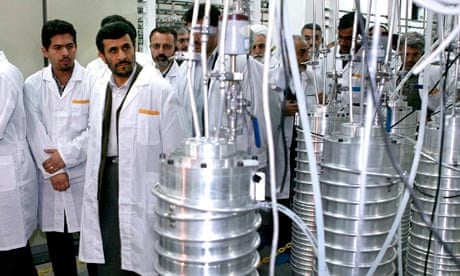Debate of late has intensified concerning the possibility of an impending military strike against Iran's nuclear facilities. This is a vital debate, however it continues to be dominated by misconceptions that cloud judgments.
Dominating discussions is the presumption that those considering military action, notably Israel and the US, fear that a nuclear-armed Islamic Republic of Iran – a country that has actively sought to "export the revolution" and calls for Israel's destruction – would actively seek to launch a nuclear attack. This has led to a stark, black-and-white debate. On one side, those who subscribe to this view demand that Iran be stopped before it is in a position to wage this nuclear war; on the other, grave doubts of the existence of a nuclear weapons programme in disbelief that this could be Iran's true intent.
Neither position, however, reflects the true dynamic. It may surprise many that an Iran intent on nuclear conflict is not what is most concerning these states. Israel and the US, for example, are well aware that Iran's agenda is not apocalyptic, and that its decision-making is informed by a logic – if an extreme and frightening one. Iran certainly desires Israel's future dissolution or collapse and to establish hegemony in a Middle East currently dominated by its political adversary, the United States, and her regional allies. Yet equally it has no desire to seek such outcomes in a manner that would result its own annihilation, as a nuclear war would guarantee. To this end, it has placed economic and military support for the likes of Hezbollah and Hamas, as well as actively supporting insurgents in Iraq and elsewhere, at the forefront of its foreign policy. It is a long-term strategy of "war by proxy".
And here, it is feared, is also where the logic behind seeking nuclear weapons has emanated – with the bomb a level of regional strategic balance is achieved allowing Iran to pursue its regional objectives with unprecedented vigour, comfortable in the knowledge that its nukes have isolated it from the international policing system and most external avenues of pressure. This, paradoxically, would allow Iran to pose a far greater conventional military threat across the whole region.
This prospect already terrifies Sunni Arab leaders, as highlighted in WikiLeaks releases and recent events in Bahrain. Fears abound of Lebanon being turned into an Iranian satellite, Iran increasingly playing agent provocateur in the internal affairs of Arab states, and unprecedented support for Hamas that could further destabilise domestic Palestinian politics and the powder-keg Israeli-Palestinian dynamic.
There is ample evidence that Iran is, indeed, developing such a nuclear weapons capability. The International Atomic Energy Agency's recent assessment, compared with the careful language usually characterising its pronouncements, is damning, and even China and Russia – Iranian allies deeply cynical of US intentions – were concerned enough to approve sanctions against Iran at the UN security council last year.
Despite all this the likes of the US and Israel are not itching for war with Iran – another widely held misconception – all too cognisant that any attack could result in one problem being solved by the creation of others, especially wider conflict and/or political violence or popular protests elsewhere in the Arab and Muslim world. As importantly they are also well aware that an attack could, domestically, actually strengthen the Iranian regime. The 2009 protests dramatically demonstrated the levels of hatred in Iran for its Islamist leaders, and there has been a massive internal power struggle since, pitting ultra-Islamists against ultra-nationalists. Any external military assault, however, would likely galvanise a sense of common cause, uniting Iran just as during the Iran-Iraq war in the 1980s.
This is why we have not seen military action to date, and why it remains unlikely in the short term. Military action will only come when it is believed that no other options remain: it's the definitive last resort. Iran though knows this too, and it has given it confidence that it can resist external pressures to change course, thus the resort to hard-hitting sanctions from European states and the EU, the US, Canada and Australia to South Korea, Japan and India.
The spectre of military intervention is also key to current strategy. If military action is clearly off the table, why would Iran change course? The best way for military action to be avoided is for Iran to genuinely fear it, so pressure will be maintained: thus the increasing emphasis on more covert tactics. Iran and its detractors remain in a protracted cat-and-mouse game, which has a long way to run. So no need to panic yet, war on Iran most certainly has not yet begun. We have some time yet to discuss the pros and cons of military action, and it may well never happen.
To ensure military action does not need to occur the onus is on Iran, as the international community has repeatedly emphasised, and if its intentions are not nefarious it needs to demonstrate it. Continuing to shun each and every opportunity to prove that accusations are unfounded will only fuel fears it has something very sinister to hide.
